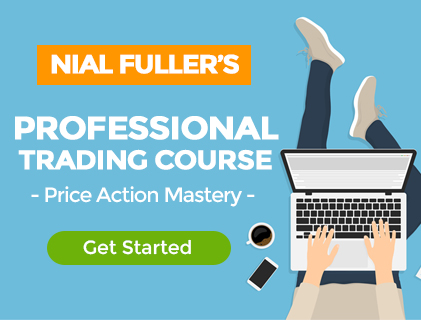You’re Only as Good as Your Last Trade
 Today’s lesson is going to help you eliminate one of the biggest psychological handicaps that is standing in the way of your trading success. First, we will identify the issue and then help you cure it and prevent it from returning. Essentially, we are going to ‘vaccinate’ you against one of the worst trading ‘diseases’ that ‘kills’ many traders each year…
Today’s lesson is going to help you eliminate one of the biggest psychological handicaps that is standing in the way of your trading success. First, we will identify the issue and then help you cure it and prevent it from returning. Essentially, we are going to ‘vaccinate’ you against one of the worst trading ‘diseases’ that ‘kills’ many traders each year…
This trading ‘disease’ is something that often develops following your last trade. As that last trade’s results permeate your brain, depending on whether you are trading properly and (or) are mentally prepared to deal with your last trade’s results, you may be at serious risk to getting stricken with this trading ‘disease’. Read on to learn what it is and how to vaccinate yourself from it…
Why your last trade matters so much, or does it?
Your last trade will tell me a lot about you as a trader and as a person. For example, does your last trade look consistent with your other recent trades? If it was a loser and I see it was 5 times as big as your previous loss, you’re doing something seriously wrong; all your losers should be very close to the same amount and some maybe at breakeven. Winning trades will naturally vary a little more (some 1r, 2r, 3r or more), but if I see many tiny winners less than 1R (1 times risk) and some super big ones, you are likely not on the right track either.
Your last trade can negatively influence your mindset and thus your next trade. Ideally, your last trade will have no effect on your next trade, but far too often for most traders it has a huge effect.
Your last trade only matters if you are trading wrong and thus allowing that last trade to take on too much importance. The fact is, your last trade should be totally irrelevant in the grand scheme of things, and so it should have ZERO impact on your mindset and your decision to take your next trade or not.
- If you just lost, it has no bearing on the fact that your next trade might be a winner.
- If you just won, it has no bearing on the fact that your next trade might be a loser.
If you stuck to your plan, whether it was a win or loss, you are on the right track. Re-read that last sentence again.
Recency bias explained in the context of trading
As I discuss in my article on the topic of recency bias in trading, a trader has recency bias when they focus too heavily on their most recent trading decisions / trades and lose perspective on the bigger picture. In other words, when a trader has recency bias, they can’t see the forest for the trees, so to speak.
“It is human tendency to estimate probabilities not on the basis of long-term experience but rather on a handful of the latest outcomes.” – Your Money and Your Brian, Jason Zweig
A trader can have both winning streak recency bias and losing streak recency bias.
- Winning-streak recency bias:
Winning streak recency bias says that traders who are on a winning streak (or who just hit a huge winning trade) are too heavily influenced by that winning streak. The implications of this are, traders may increase risk size on their next trade above what they are comfortable with losing and (or) they may enter increasing number of trades that violate their trading plan / trading edge. The primary psychological error at play here is over-confidence. As a trader wins, it’s human nature to perceive less risk in the market and start inflating their sense of trading ability and how much they were responsible for that last winner, to the point where it becomes detrimental. This usually ends in a massive loss or series of losses that quickly voids all the gains made during the winning streak.
- Losing-streak recency bias:
Losing-streak recency bias says that traders who are on a losing streak (or who just incurred a large loss) are also too heavily influenced by that losing streak. The implications of this are, traders may decrease risk size below their normal 1R risk amount and (or) they may enter decreasing number of trades due to fear of losing more. The primary psychological error at play here is fear. As a trader loses, it’s human nature to start perceiving more risk in the market than is really there and to start over-worrying about losses and this works to deflate one’s sense of trading ability and confidence. This usually ends up in missed opportunities and can result in a perpetual cycle of fear and losing until the trader ultimately gives up trading altogether, feeling jaded and even ‘scammed’ by the market.
- How to cure recency bias in trading:
I wish there was a magic pill that I could send you in the mail that would cure your susceptibility to recency bias in trading, but sadly, there isn’t. So, you’re going to have to listen closely and do what I say if you want to avoid this mental trading plague.
Avoiding recency bias in trading begins with knowledge, with education. You must first understand that it’s simply human nature to become overly-affected by your last trade’s results. Once you understand this, you will start to become more self-aware and hopefully you’ll catch yourself in the middle of becoming too influenced by your last trade. This is your cue to take a break, step away from the market for a day, go read a book, play golf, do whatever, and come back tomorrow or the next week, after all, the market will be there tomorrow. Maybe not what you want to do or hear, but it works, trust me.
Next, you need to understand that one trade simply doesn’t matter. So, don’t make it matter! If you are managing risk properly on every trade and sticking to your trading plan, you should not be surprised or overly-emotional about the results of your last trade, win or lose. And, as we will get into next, you must remember that any one trade, looked at individually, is essentially a random event. Your trading edge that gives you a better than 50% chance of winning, is ONLY realized over a large enough series of trades. Thus, looking at the results of ONE trade within a chain of say 20 to 40 trades, is completely pointless.
The only thing you should be worried about regarding your last trade, is IF it was consistent with your trading plan or not. The results of your last trade mean nothing and should mean nothing, otherwise you’re doing something wrong. Drill that into your head if you want to permanently overcome recency bias.
You must train your brain to ‘behave’ properly after your last trade
As I touched on above, we are all basically pre-wired in such a way that allows our brains to naturally give too much significance and become overly-influenced by the results of our last trade. For most traders, their last trade impacts their next trading decision far too much, and the resulting emotional highs and lows in confidence can lead to trading account destruction very fast.
Note: I am not saying you should totally discount when you feel confident in your trading abilities or even when you feel fearful. Indeed, these feelings can be healthy and normal in the right amounts and they are part of a savvy trader’s gut feel for the market. But, they become dangerous when they are too frequent or intense and this is what we must prevent from happening.
Here are some tips on how you can train your brain to function properly after your last trade so that you do not become negatively affected by that trade’s outcome:
- Trick your brain into not feeling any pain. By utilizing the power of positive thinking and using positive trading affirmations as well as meditation, you can basically distract your brain from obsessing over negative thoughts (like a losing trade, for example) and even physical pain as discussed in the article trick your brain into not feeling any pain.
- Having a strategy to block out negative thoughts as well as to deal with them when they do arise will also go a long way in helping you eliminate the recency bias we discussed previously.
- Make SURE you are sticking to your predefined risk on every trade. If you don’t, you will quickly become overly-emotional whether that trade wins or loses. If it wins you will be influenced by the winning recency bias and if it losses you will be influenced by the losing recency bias as discussed above.
- Make SURE you are not over-trading by sticking to your trading plan criteria consistently no matter what. If you over-trade you’re going to become addicted to the feeling of trading, as I discuss in my recent article on anticipatory trading plans. Over-trading stems from giving too much weight to your last trade.
- Remember that any given trade’s results are simply one instance of your edge in a large series, see next section for more on this!
Edge vs. Emotion
Your trading edge is the basically the entry trigger that, played out over a series of trades, provides you with a better than random chance of making money. The edge needs to playout undisturbed however, regardless of your emotions. However, your emotions can impact your ability to trade the edge, so this is the paradox of trading edges vs. emotions.
Thus, your last trade needs to be irrelevant to you, so that you can truly let your trading edge play out over the series of trades it needs to MAKE YOU MONEY.
As the late great Mark Douglas teaches, there is a random distribution of wins and losses for any given trading edge, and this is THEE reason why your last trade is and SHOULD BE irrelevant. You need to continuously remind yourself of the random distribution between wins and losses so that you remember why your last trade shouldn’t matter, and so that you don’t let it negatively influence your next trade.
What you feel is 100% irrelevant as it relates to what the market will do next. Yes, you can use your gut feel as a tool, but there is a very fine-line between savvy gut trading feel and over-use of it.
If you are trading with discipline and managing your risk properly on every trade as well as not taking stupid trades, this will go a long way to eliminating much of the negative feelings traders experience after a win or loss. After all, if you know you stuck to your plan, even if the trade was a loss, you have nothing to be ashamed of or mad it, you just chalk it up to a losing occurrence of your edge (one in large series of trades) and move on; let time go by and stick to your plan. Once you start trading as if every trade is independent of the next (because it is), you will naturally start to interact with the market in a way that leads to trading success.
Trade like a hedge fund…
Top-performing hedge fund managers know that to make money for their clients they must be calm, collected and calculating. They simply cannot afford to constantly be jumping in and out of the market, chasing every little thing they think might be an opportunity. They know if they did this, they would quickly have many very angry investors after them. Similarly, you cannot afford to constantly jump in and out of the market, transaction costs eating away at you aside, trading like a day trader is simply not conducive to the proper trading mindset.
If you want to trade like you are running a top-performing hedge-fund, you better get ready to do a lot more study and observation and a lot less actual trading. If you had $1 million under your management, would you feel any need to “Make money fast”? No! Because you know just ONE good trade a month or even every three months can make you a huge gain, and you know that the best way to maximize your long-term gains is simply to avoid stupid trades (over-trading).
Hedge fund managers know that less trades = better results, this is a proven statistic in fact. When you trade less it’s a more peaceful existence and provides you with a far better ability to obtain the neutral state of mind towards the market that you need to succeed (by that I mean, not letting your last trade matter, essentially). If you’re always trading, you’re feeling the highs and lows of those trades a lot more, or at east you’re a lot more likely to. The more often you put yourself in the way of the temptation to be overly-affected by your last trade’s results, the more likely you are to be affected by it. Similar to eating healthy in that the easiest way to do it is to simply not stock your house with unhealthy food, the easiest way to avoid allowing your previous trade to affect you negatively is to make sure you aren’t over-trading or over-leveraging for that matter.
Conclusion
Your last trade is a microcosm of your overall trading performance and mental trading state. If a trader is successful over the long-term, I could look at their last trade at any time of the year and it would make sense with his trading plan and it would reflect a disciplined, consistent approach, win or loss. This is because the professional traders know that the very things that lead to successful trading like, consistency, discipline and patience are the same things that help to ‘vaccinate’ them against the ‘plague’ of their last trade’s results infecting their minds to influence their next trading decision.
If I look at a snapshot of your last two or three trades, could I say the same? Could I say that it reflects someone who is not being influenced by their last trade? Or would it be glaringly obvious to me that you ARE letting that last trade dictate your next move in the market? To get to the point of being a calm, collected professional trader who is totally unaffected by the results of his or her last trade, you must start learning the proper techniques and strategies discussed both in this article and expanded upon in my professional trading course.
What did you think of this lesson? Please share it with us in the comments below!






Thanks master.
I will read this several times
Your teaching is so impactful. I observe that all your trade are majorly on daily time frame. Can I trade it well on 4H time frame. I wish to join the community for more trading skill.
Thanks nial for sharing. Every day I am always eager to read your blog.
Thank you for that reminder on decluttering.
Thanks, Nial, for this great article here again. It really solved my problem as regards how to create a short and powerful trading plan. Your template sample is quite awesome. I think it is a very difficult thing do, but don’t know it’s this easy.
Am actually ex army
I served the British army for 12 years. Good to see you make an army referenced article. Very good work Nial.
This is breathtaking lesson…
Thanks, Nial!
Thank a lot Nial.
Thanks a lot, Nial!
That was a truly beautiful lesson!
what to know more about risk management
if I want to risk 1$ on a pair what will be my lot size and pip value to set as a Stop loss
Important lesson. Thanks
Magnificent article
Almost every articles content and language from Nial are really giving positive effects including this one.
So thank you Nial.
Nial is my preferred Forex mentor anyday
all i can say is thank you so much
Thank Nial
Thanks Nial;
This was a great post which actually helped me rephrase my thoughts after my losses.
I am still not very profitable at this stage but every time I lose, I look back to see what I could have done better and learn to minimize my losses maybe exit at a small profit rather than a loss!!
However; after having read this, I also now appreciate the fact that losses are a part of it as well and I feel less discouraged before taking the next trade than before. Things sometimes are easier said than done – true – but after reading these guidelines, I learn a lot and appreciate it heaps. I am learning a lot and the best part of it is that I am enjoying it.
Thanks for spending the time to post such valuable guidance!
Duncan
Another good lesson. As they say ” life is what you make it “and that goes for trading also, think before you act and know that never one day (or life is ) is the same as the last one, so treat as Nial says each trade as a new beginning. Thanks .
good one sir
Excellent article pactice makes perfect I’m going to practice every advice in this article thanks Nial
Thanks Nial, I for one admit that I was influenced by previous success and could not see the next trade through that; I was brought back to reality with some quick losses, however I puuled my thoughts together and looked at my next trade with confidence and considered every possible angle before taking it and I am now back on track. This article has since reassured me of that fact and I must disregard any previous trade before attempting the next. Your articles help keep sanity in the trading game and also leads to further success. Many Thanks. Winston
Every word in this article is like gold…
Thanks AGAIN Nial.
Thanks Nial. That’s reminds me of a trade some years ago before I quit trading. I bought EUR/USD on $0.05 lots with $20 risk and i made a profit of $183 on that trade so that winning recency bias got into my head and I felt overconfident, then i went ahead to trade $0.10 lots on my next two trades and I lost both. That’s how I gave back the profit I made from that EUR/USD to the market. Fear start to catch me then I reduce my lots to $0.01 which definitely reduced my profit that I would have make on some trade. Though I just came back to the market since two or three years ago that I quit but am still using demo account to test my trading strategies before trying to come back live. Thanks once more.
Nial thx for this one also. i have improved alot in trading just by reading your articles. thx alot
Excellent and timely. Thanks Nial.
Typical of Nial’s mail’s. I am not in anyway surprised to find this post hitting the nail on the head as it does and so timely as well. I always find Nial’s post as informing, factual and educating like this one. Thanks to Nial, from now I am no longer going to be enslaved to my last trade’s results.
Thanks for the trading insight. Particularly about training our brains to behave properly.
this makes sense!!
Well I am a true novice,I have not started trading yet. If I understand well briefly you say if one is a trader one must bury the past.That is my motto
So I feel l Iam going to do well.
This article explains what happened when I first started trading forex. After reading many of Nial,s writings on the subject of trading I feel that I am expanded in my knowledge and confident about my trading decisions.I really appreciate Nial,s works,
i noticed today after one loosing trade that it can’t reflect, the other running trades .
After that i checked my emails and i saw your email as first .I have read it and then it was like you would heard what i sayd before It was simmilar to :
If you just lost, it has no bearing on the fact that your next trade might be a winner.
If you just won, it has no bearing on the fact that your next trade might be a loser.
thank you for your work .
traders mindset ..
have a nice day.